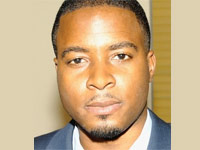
The donation of two thousand units of drug testers to Her Majesty’s Prisons will not only further strengthen the penal institution’s efforts to reduce the amount of drug contraband coming into the facility, but will also help to facilitate its drug treatment programmes while shoring up in-house security measures.
Officials from the United States Embassy, Nassau, donated the 2000 units to officials of Her Majesty’s Prisons along with a Body Orifice Security Scanner (B.O.S.S.) Chair that detects metal objects hidden in body parts and two cellular telephone locaters.
Minister of National Security, Dr. Bernard J. Nottage and Minister of State for National Security, Senator Keith Bell, were on hand for the presentation.
Prison Superintendent, Dr. Elliston Rahming, said the equipment – which he called cutting-edge, security-related equipment – will enhance the security measures already in place at the facility.
Dr. Rahming said the donation of the testers was particularly significant as it will make the process in determining which inmates have drug addictions more efficient. This, in turn, will lead to a shorter turnaround in addressing treatment opportunities for those inmates.
“In the past, in order to determine whether an inmate had drugs in their system, we had to take a sample and send it to a lab somewhere,” Dr. Rahming said. “That has now been eliminated because within less than a minute we will not only know whether an inmate has drugs in his/her system, but the extent to which there is drugs in the system because the density of the indicator will indicate whether it is recent or whether it is residual.
“It is a very sophisticated system and that allows us to make almost instantaneous judgments as to which housing unit an inmate should be placed; whether he/she is fit to go out on a community project or to a work programme, those kinds of things,” Dr. Rahming added.
Prison officials say awareness of which inmates are using drugs, or are addicted to drugs, presents an even greater opportunity for them to manage the internal security of the facility as drug use can have psychiatric and physiological impact on some users, especially drugs such as marijuana, cocaine and/or alcohol.
In worst-case scenarios, the abuse of these particular drugs, amongst others, can lead to schizophrenia, mood swings and/or long-term depression.
Dr. Rahming said the facility has launched two drug treatment programmes – one of them a drug therapy programme that was launched two months ago – as part of its drug detection and treatment programmes.
The drug therapy programme is a nine-month, voluntary, comprehensive drug treatment programme that is based on a programme at the Coleman Federal Institution in Florida that Dr. Rahming said gives inmates the refusal skills to say no when temptation arises.
He said the ability to say no, has a direct impact on the facility’s recidivism rate as almost 80 per cent of the persons entering the prison, do so with drugs already in their system.
“While it has been only two months since its inauguration, the programme is going very well and we are pleased with the fact that we have reached a point where we are not only talking about drug education, but we are teaching them how to say no,” Dr. Rahming said.
“Inmates already know the harmful effects of marijuana and cocaine. What they don’t know is how to say ‘no’ when confronted with it and that is what the drug therapy programme does. It’s been used in many prisons, its tested, its tried and it works. This programme is supposed to give them the internal fortitude to be able to walk away without succumbing to the temptations that drugs tend to bring,” Dr. Rahming added.
Dr. Rahming said the use of the drug testers should further lead to a reduction in the demand for drugs.
“There is also a supply side and a demand side and if you can reduce the demand then obviously you cut down on the supply,” Dr. Rahming said. “If fewer inmates are on drugs, that lessens the necessity for persons to try and traffic drugs within the prison because there is no market for it and so that is another benefit of testing for drugs, having drug therapy; having drug education.”
By Matt Maura
Bahamas Information Services
Caption: United States Charge d’ Affaires Mr. John Dinkleman (first left) and Her Majesty’s Prisons Superintendent Dr. Ellison Rahming, sign the paperwork concluding the “Hand-Over” of a Body Orifice Security Scanner (B.O.S.S.) Chair, two cellular phone locaters and 2,000 Units of Drug Testers from the United States Embassy, Nassau, Office to officials at Her Majesty’s Prisons. Minister of National Security, Dr. Bernard J. Nottage (third right) and Minister of State for National Security, Senator Keith Bell, were on hand for the presentation. (BIS Photo/Patrick Hanna)



